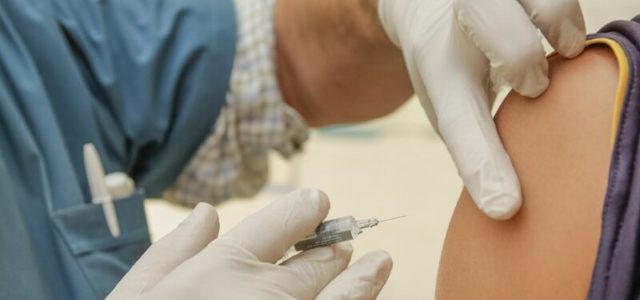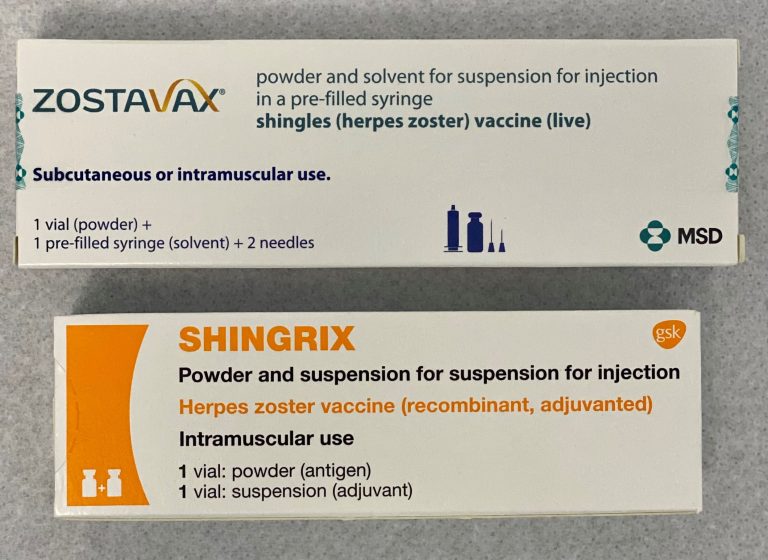GSK plc (LON/NYSE) has announced positive data from the ZOSTER-049 long-term follow-up phase III trial which followed participants for up to approximately 11 years following initial vaccination with Shingrix (Recombinant Zoster Vaccine or RZV). The final trial data demonstrate that RZV maintains efficacy against shingles for more than a decade in adults over 50. The data will be presented at ESCMID Global (European Society of Clinical Microbiology and Infectious Diseases) 2024, formerly known as ECCMID in Barcelona, Spain (27-30 April 2024).1
New long-term data show Shingrix continues to provide high protection against shingles in adults aged 50 and over for more than a decade
· End-of-trial data show 79.7% efficacy in participants aged 50 years and over, six to 11 years after vaccination1
· Vaccine efficacy remains high at 82.0% at year 11 after initial vaccination[1]
· No new safety concerns were identified during the follow-up period1
The results from ZOSTER-049, an extension from two phase III clinical trials in adults aged 50 and over (ZOE-50 and ZOE-70), include:1
· 79.7% vaccine efficacy (VE) in adults aged ≥50 cumulatively within the period from year six to year 11 after vaccination (95% CI 73.7-84.6)
· 82.0% VE in adults ≥50 at year 11 (95% CI 63.0-92.2), showing VE remains high in each year after vaccination
· 73.1% VE in adults aged ≥70 cumulatively from six to 11 years after vaccination (95% CI 62.9-80.9) showing high VE rates across all age groups
Dr Javier Díez-Domingo, Principal Investigator, FISABIO (Foundation for the Promotion of Health and Biomedical Research of the Valencian Community, Spain) said: “These final data demonstrate continued protection over more than a decade with high efficacy maintained in both the 50+ and 70+ age groups. Infectious diseases like shingles pose a significant risk to adults due to the natural decline in our immune system, and these data represent a remarkable advancement in our understanding of what can be achieved long-term for effective protection against shingles.”
Phil Dormitzer, GSK Senior Vice President, Head of Vaccines R&D, said: “These data go far beyond the typical long-term follow-up period for a trial, tracking the efficacy of vaccination for some participants as they aged into their 70s, 80s and 90s. With the vaccine now included in many national immunisation programmes around the world, these data add to the body of evidence on the extended long-term protection against shingles and provide further confidence to inform public immunisation strategies.”
Globally, shingles will affect up to 1 in 3 people in their lifetimes.[2],[3],[4],[5] A variety of factors can increase the risk of developing shingles, including advancing age and immunodeficiency or immunosuppression,[6] as well as other chronic conditions such as COPD, diabetes mellitus, and asthma.[7] Shingles typically presents as a rash, with painful blisters across the chest, abdomen or face,[8] with the pain often described as aching, burning, stabbing or shock-like.2 Following the rash, up to 30% of people experience post-herpetic neuralgia (PHN),[9] a long-lasting nerve pain that can last weeks or months and can occasionally persist for several years.2 Shingles is also associated with significant healthcare and human cost, with 57% of people with shingles reported missing work for an average of 9.1 days.[10]
We will continue to evaluate long-term data and conduct real-world evidence studies related to vaccine efficacy, immunogenicity, and safety across indicated populations, including those at highest risk of shingles to assess a potential need for revaccination in future.
About ZOSTER-0491
ZOSTER-049 is a phase III open-label, long-term follow-up trial from two pivotal phase III randomised clinical trials (ZOE-50, ZOE-70). The trial evaluated the efficacy, safety, and immunogenicity in adults 50 years and over at time of vaccination, for six additional years after completion of the ZOE-50 and ZOE-70 trials, up to approximately 11 years of follow-up.
ZOSTER-049 included over 7,000 participants from 18 countries across five continents, with vaccine recipients compared to historical controls.
No new safety concerns were identified during the follow-up period in ZOSTER-049. No serious adverse events were considered causally related to RZV vaccination by the investigators. In adults aged 50 years and over, the most frequently reported adverse reactions with RZV are pain at the injection site, myalgia, fatigue and headache. Most of these reactions were mild to moderate in intensity and generally lasted less than three days.[11]
About shingles
Shingles is caused by the reactivation of the varicella-zoster virus (VZV), the same virus that causes chickenpox.2 By age 50, VZV is present in most adults[12] and may reactivate with advancing age.8 As people age, the strength of the immune system response to infection wanes, increasing the risk of developing shingles.2
About Shingrix
Shingrix (Recombinant Zoster Vaccine or RZV) is a non-live, recombinant subunit vaccine indicated for the prevention of shingles in adults 50 and over. It combines an antigen, glycoprotein E, with an adjuvant system, AS01B, and may help overcome the natural age-related decline in responses to immunisation that contributes to the challenge of protecting adults aged 50 and over from shingles.[13],[14] RZV is not indicated to prevent primary varicella infection (chickenpox). In several countries, RZV is also approved for adults aged 18 years or over at increased risk for shingles. The use of RZV should be in accordance with official recommendations and local product label.
Please refer to the Product Information (PI) for important dosage, administration, and safety information in Europe available at this link: https://www.ema.europa.eu/en/medicines/human/EPAR/shingrix
[1] Diez-Domingo J, et al. Adjuvanted recombinant zoster vaccine (RZV) is the first vaccine to provide durable protection against herpes zoster (HZ) in all age ranges ≥50 years: final analysis of efficacy and safety after 11 years (Y) of follow-up. Abstract presented at European Society of Clinical Microbiology and Infectious Diseases (ESCMID); 27-30 April 2024, Barcelona, Spain.
[2] Harpaz R, et al. Advisory Committee on Immunization Practices (ACIP), Centers for Disease Control and Prevention (CDC). Prevention of herpes zoster: recommendations of the Advisory Committee on Immunization Practices (ACIP). MMWR Recomm Rep. 2008;57(RR-5):1-30.
[3] Australian Institute of Health and Welfare. Shingles in Australia. Available at: https://www.aihw.gov.au/getmedia/759199ff-f5c8-421d-a572-aaa984a02b49/aihw-phe-236_shingles.pdf.aspx Last Accessed: April 2024.
[4] Lee C, et al. Lifetime risk of herpes zoster in the population of Beijing, China. Public Health Pract (Oxf). 2023;5:100356.
[5] Curran D, et al. Meta-Regression of Herpes Zoster Incidence Worldwide. Infect Dis Ther. 2022;11(1):389-403.
[6] Chen S-Y, et al. Incidence of herpes zoster in patients with altered immune function. Infection. 2014; 42: 325-334.
[7] Marra F, et al. Risk Factors for Herpes Zoster Infection: A Meta-Analysis. Open Forum Infect Dis 2020;7(1):ofaa005.
[8] Mueller, N.H., et al. Varicella zoster virus infection: clinical features, molecular pathogenesis of disease, and latency. Neurologic clinics. 2008;26(3):675-97.
[9] Kawai, K., et al. Systematic review of incidence and complications of herpes zoster: towards a global perspective. BMJ open. 2014;4(6).
[10] Rampakakis E, Stutz M, Kawai K, Tsai TF, Cheong HJ, Dhitavat J, et al. Association between work time loss and quality of life in patients with Herpes Zoster: a pooled analysis of the MASTER studies. Health and Quality of Life Outcomes. 2017;15(1).
[11] Grading of Recommendations, Assessment, Development, and Evaluation (GRADE): Use of Recombinant Zoster Vaccine in Immunocompromised Adults Aged ≥19 Years. Centers for Disease Control and Prevention (CDC). Available from: https://www.cdc.gov/vaccines/acip/recs/grade/recombinant-zoster-immunocompromised.html. Last Accessed: April 2024
[12] Johnson, R.W., et al. Herpes zoster epidemiology, management, and disease and economic burden in Europe: a multidisciplinary perspective. Therapeutic advances in vaccines. 2015;3(4):109-20.
[13] Cunningham, AL, et al. Efficacy of the Herpes Zoster Subunit Vaccine in Adults 70 Years of Age or Older. New England Journal of Medicine. 2016;375(11):1019-32.
[14] The GSK proprietary AS01 adjuvant system contains QS-21 Stimulon® adjuvant licensed from Antigenics LLC, a wholly owned subsidiary of Agenus Inc. (NASDAQ: AGEN), MPL and liposomes.









































